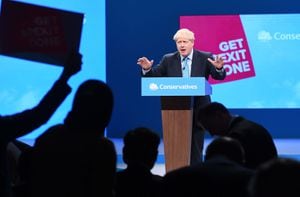'No-deal Brexit could be good for Guernsey'
As Brexit negotiations hot up and Boris battles to ‘take back control’, opinions differ on what the outcome will be and what impact it might have on Guernsey. Susan Wallace went in search of some insight at the recent Conservative Party Conference in Manchester...

GUERNSEY’S status as a global financial specialist and its dominant industry being finance means any knock-on from the UK looking to leave the European Union is key to many islanders and their clients.
It remains uncertain how the eventual outcomes of this week’s unravelling developments, decisions, approvals, amendments, extensions and other possible paperwork in Westminster and Brussels will ultimately influence future economic models and individual lives.
Wealthy business people and finance-related professionals will have been following, and understand, the financial and legal jargon of Brexit more than most. They may also judge how successive British governments balance or cook the books, including tasty treats from Europe, and be aware of what the post-Brexit transition period means – oh, yes.
Meanwhile, most ordinary people, wanting Brexit done, spend their monetary lifetime stuck on the APR step, let alone fathoming out what is meaningful for them when the zeros rattle around in billion-pound calculations.
As Prime Minister Boris Johnson’s team works on the mathematics of the numbers for his deal, division over Brexit remains a shadow of the class divide.
The last day of the three-day Guernsey Retro Festival, deemed a celebration of the end of austerity and 1950s and 60s nostalgia, coincided with the first day of the recent four-day Conservative Party Conference in Manchester – where I attended a panel discussion co-hosted by the Institute of Economic Affairs and The TaxPayers’ Alliance on ‘The End of Austerity: Why tax cuts are better than spending hikes’.
They say a week’s a long time in politics. This month – let’s dub it Outgoing October – was always going to have its speed dial cranked up, and down, with Brexit’s Halloween deadline. There are different dimensions of time in politics. Sitting in an engaging, illuminating conference fringe event for 90 minutes can seem like the longest, best day at school; while the whole four-day event flies by in a blink.
Experts at the meeting shared views and debated arguments, taking questions from the packed audience in the secure zone ThinkTent.
High-profile panellists included the TPA’s chief executive John O’Connell, the IEA’s Kate Andrews and politicians Steve Baker MP, chairman of the European Research Group, Scottish Conservative Andrew Bowie MP, and Julian Knight, the MP for Solihull who has a background with HM Treasury.
I spoke to Mr Knight afterwards, exclusively for the people of Guernsey.
He said: ‘In relation to the ongoing discussions with Guernsey in terms of its status post-Brexit, I think it’s really important that we, as a government, ensure that the real concerns of Guernsey, and other islands or other jurisdictions in a similar position, are listened to and are taken on board – because this process about Brexit is a whole national crisis. It’s not just about one larger constituent part of the United Kingdom, or any other parts of the United Kingdom; it’s about everyone. We need to be very mindful about Guernsey and its issues.’
Interestingly, he added: ‘However, perhaps remaining in the EU would be a more treacherous course for Guernsey because the difficulty with Guernsey is that there’s going to be a greater degree of tax harmonisation now throughout Europe and there are major moves in order to ensure that individual jurisdictions, for example Guernsey’s jurisdiction, are effectively brought into harmony with European taxation.
‘Perhaps a no-deal Brexit would be good for Guernsey if it helps it keep its distinctive tax system.’
Sitting close by the PM on Super Saturday was the new Chancellor of the Exchequer, Sajid Javid – a name as tongue-twisting as all those incomprehensible technicalities.
I watched Mr Javid speak eloquently at conference. However, part of the rhetoric went: ‘As we get Brexit done and leave the EU, it’s the right time to ask ourselves some big questions: Who are we as a country? How do we see ourselves in the years ahead? How will we shape our economy for the future?’
In case the fireworks, or damp squib, of this autumn’s Brexit negotiations weren’t enough for you, Mr Javid has set the UK’s Budget date promptly for 6 November – albeit political agendas are on shifting sands.
I also obtained a new, thought-provoking 52-page report entitled Popular Capitalism by Robert Colvile, the director of the Centre for Policy Studies, at conference. The author cites Arthur Brooks, the outgoing president of the American Enterprise Institute, who, Colvile writes, challengingly asks of his fellow conservatives: Why do you get up in the morning? Is it to entrench the power and wealth of those who already have power and wealth? Or is it to expand the power and wealth to those who do not have them? If it is the former, Brooks says, you are doing evil. If it is the latter, you are doing good.
The meaning, writes Colvile, is that all Conservatives need to dedicate themselves to giving people opportunity, ownership, control.
Governments tend to take austerity measures – such as cutting back on public services – when they’ve lost control and got into too much debt themselves, owing a fair old chunk to the private sector at that.
Capitalism does not come without its economic and moral conundrums. Those positioned to own, or make, a lot of money are liable to pay a lot of tax. Those somehow with little, working or otherwise, are positioned to have less and pay less, if any, tax – and, arguably, rely more on state provision as they use library books and computers, get top-ups to systemic low, insecure pay, need housing, become unemployed, ill, age and die – in no particular order. Grumbling about taxes is part of the human condition yet, fundamentally, government income – for its public spending – is tax. Some might say: ‘1%, give it a rest.’
With government bank bailouts and fat cats still creaming off bonuses so obscene as to put the fabulous, top prize money of the Channel Islands lottery Christmas draw to shame, there is not much sense of the mighty having fallen far enough from the money tree to lose many of their nine lives. Austerity ostensibly over, or not, the issue is very contentious in the UK.
It was that old chestnut, ‘the global financial crisis’, that apparently did for us last time, with this last decade of austerity – as if commercial banks run everything.
Politicians need to protect and facilitate business – the world has to turn – and its wealth. Yet people managing heating, hunger, out-of-reach health, let alone legal help, homelessness or other horrors, oddly enough, aren’t glassy-eyed about the glistening windows of skyscrapers in London and New York back in the noughties, or impressed by bustling, bold buildings in Brussels on the news.
They are likely to blame any politician to hand for the knock-on pain they feel, or see. Boris Johnson has said his deal is about taking back control. Of course, not everyone agrees. If, in a few years’ time, people don’t feel better off, with things more under control, the big question, and spin, will be – who does this blame bottle stop at?





